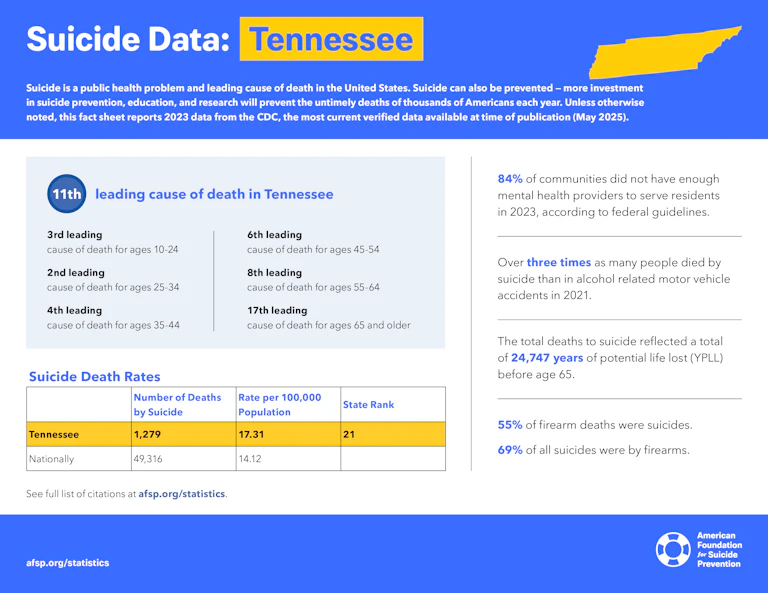Tennessee

Tennessee suicide prevention plans and initiatives
Tennessee’s suicide prevention activities are led by the Tennessee Suicide Prevention Network (TSPN), the statewide public-private organization responsible for implementing the Tennessee Strategy for Suicide Prevention. TSPN is overseen by the gubernatorial appointed Tennessee Suicide Prevention Advisory Council, an independent, non-partisan, voluntary group of individuals, organizations, and public and private agencies who promote community awareness of the signs of suicide and intervention strategies for the prevention of suicide.
The Tennessee Strategy for Suicide Prevention, most recently revised in 2023, is the state’s guiding suicide prevention document and shapes TSPN’s outreach, education, and awareness efforts throughout the state of Tennessee. Additional state suicide prevention initiatives and programs are housed within the Tennessee Department of Mental Health & Substance Abuse Services.
Tennessee laws
Key:
- Required by law
- Encouraged by law
- No law in place
Crisis lines and 988 implementation
- Addresses 988 infrastructure and provides for telecom user fee
- Addresses 988 infrastructure but does not include telecom user fee
- 988 law limited to creating an exploratory commission, advisory committee, or task force
Mental health parity
- Public health plans (e.g., Medicaid) regularly submit parity compliance analyses to state regulators
- Private health plans (individual and group) regularly submit parity compliance analyses to state regulators
K – 12 school suicide prevention
- Inclusion of the 988 Suicide & Crisis Lifeline and/or other crisis line(s) on student ID cards
- Student allowances for excused mental health absences
- School personnel must report student suicide risk to a parent and/or guardian
- Suicide prevention and/or mental health training for certain school personnel, annual
- Suicide prevention and/or mental health training for certain school personnel, not annual
- Suicide prevention, intervention, and postvention policies/programming
- Student education on suicide prevention
Health professional training in suicide assessment, treatment and management
- Mental health professionals receive regular training
- Mental health professionals receive one time training
- Medical/surgical professionals receive regular training
- Medical/surgical professionals receive one time training
Conversion therapy bans
- Prohibits licensed/board certified mental health providers from engaging in conversion therapy with minors under 18 years of age
- Prohibits licensed/board certified mental health providers from engaging in conversion therapy with vulnerable adults
- Prohibits use of state funds for any purpose related to conversion therapy (e.g., conducting, making a referral for, or extending health benefits coverage for)
University and college campus suicide prevention
- Inclusion of the 988 Suicide & Crisis Lifeline and/or other crisis line(s) on student ID cards
- Students receive information on available mental health and/or suicide prevention services and/or resources
- Adoption of suicide prevention/awareness policy or program
Firearms
- Process for extreme risk protection orders (ERPOs)
- State voluntary do not sell list